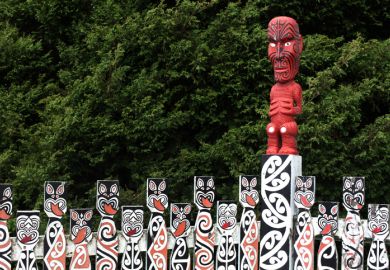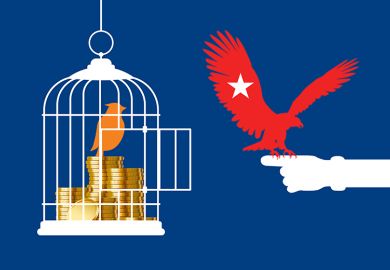Universities on both sides of the Tasman Sea have been accused of crossing the line from education to indoctrination after imposing assessment tasks that focus on indigenous traditions.
The University of Auckland’s “Waipapa Taumata Rau” courses, which are compulsory for all first-year students, have attracted criticism from David Seymour – leader of the libertarian Act Party, part of the governing coalition – because they include content about New Zealand’s foundational Treaty of Waitangi.
Meanwhile, Macquarie University’s requirement of “welcome to country” acknowledgements during student presentations has triggered a review of its law school, following a week of damning articles in The Australian newspaper.
Auckland’s courses, which cost up to NZ$1,197.90 (£530.42) for domestic undergraduates and NZ$5,730.15 for foreigners, are tailored to students in the arts, business, engineering, health and science faculties. The science version was piloted last year and “received excellent feedback from students”, a spokeswoman said.
She said the courses focused on the content needs of each faculty, including professional requirements, and offered “core knowledge and essential skills” to help students “adjust to university life and [achieve] success in their future studies”.
They also offer Māori cultural perspectives as understood through the Treaty of Waitangi. The business version of the course, for example, explores “landmark Treaty cases and settlements to understand the legal and historical underpinnings of New Zealand’s business environment”, according to Auckland’s website.
Seymour said the courses were “a perversion of academic freedom” for students to choose their electives and for professors to criticise course material. “It’s largely being taught by people outside a particular faculty for, frankly, political purposes rather than educational,” he told Newstalk ZB radio.
“A lot of people, particularly in the electorate I represent, are now looking at overseas universities because they feel unable to speak up against these things.”
Seymour said the government would resolve the situation by appointing new members to the university’s governing body.
Auckland’s spokeswoman criticised “disinformation” about the courses. “The history of New Zealand and the Māori world is core knowledge for any student studying in this country. For many professional bodies and New Zealand corporates, this fundamental knowledge is a requirement. Employers value employees who have a global perspective and can understand and navigate multiple cultural differences.”
The 1840 treaty between Māori tribes and English colonisers arouses strong emotions in New Zealand. Seymour’s bill to redefine the treaty’s principles triggered what may have been the biggest protest in the country’s history, even though Act’s coalition partners have vowed not to let the bill proceed beyond a parliamentary inquiry.
Commentators on a pro-treaty Facebook group backed the university. “It would be best for politicians to be neutral on these subjects and leave the decisions to those that are affected,” one said. “Universities are well within their authority to establish and maintain standards necessary for completion of any and all degree and certificate programmes,” said another.
Meanwhile, Macquarie vice-chancellor Bruce Dowton cited “issues raised recently by students” when ordering a review of teaching at his law school. It follows a string of newspaper stories criticising a requirement for students to perform “exceptionally well-written” acknowledgments of Aboriginal traditional owners at the start of oral law presentations.
The acknowledgments are recited during “law reform campaign” presentations worth 30 per cent of marks for an elective subject called Age and the Law. Macquarie’s website says the subject examines the impacts of legal frameworks on children and older people, and “is relevant to students interested in human rights and social justice”.
A presentation transcript seen by Times Higher Education acknowledges local Aboriginal elders and the “injustice and discrimination” imposed on them by Australia’s legal system, before proceeding onto a much longer account of atrocities against children and lack of legal accountability during the Philippines’ “war on drugs”.
The Australian reported accusations that Macquarie had confused academia with activism and was pressuring students to express opinions they did not believe, as part of a legal education that prioritised “rights theory” over concrete skills and produced “automatons” rather than critical evaluators.
This followed shadow education minister Sarah Henderson’s criticism of “creeping indoctrination and activism in education” on Radio 2GB. “This is all part of what we are seeing in our universities’ decaying standards. The government hasn’t thrown the book at universities enough.”
Dowton said the three-week review would canvass staff and student views and benchmark “relevant practices” against other major law schools. “We take feedback from our students seriously. We want an…environment where divergent views are respected. If changes need to be made, changes will be made.”
Register to continue
Why register?
- Registration is free and only takes a moment
- Once registered, you can read 3 articles a month
- Sign up for our newsletter
Subscribe
Or subscribe for unlimited access to:
- Unlimited access to news, views, insights & reviews
- Digital editions
- Digital access to THE’s university and college rankings analysis
Already registered or a current subscriber?









